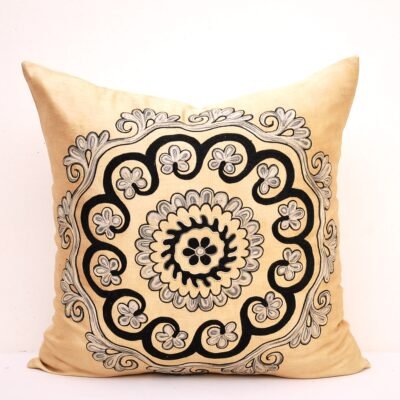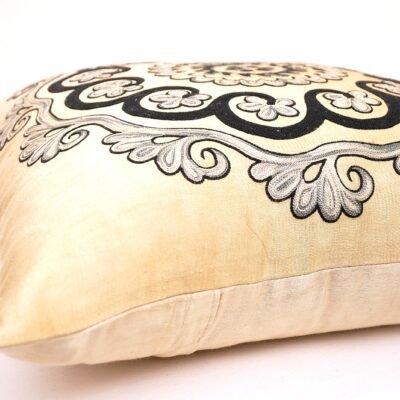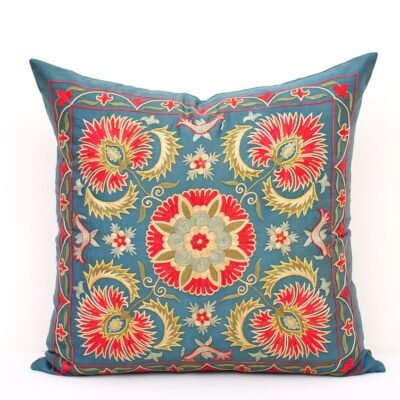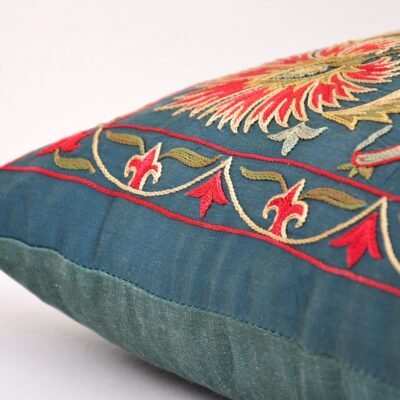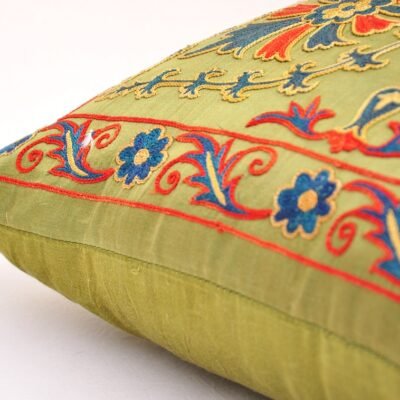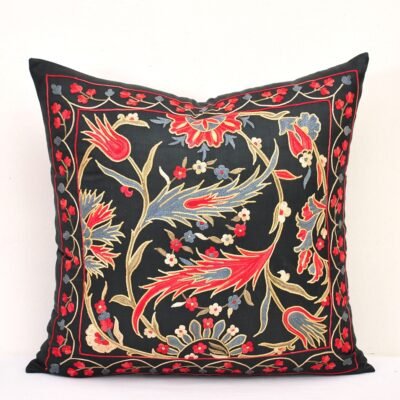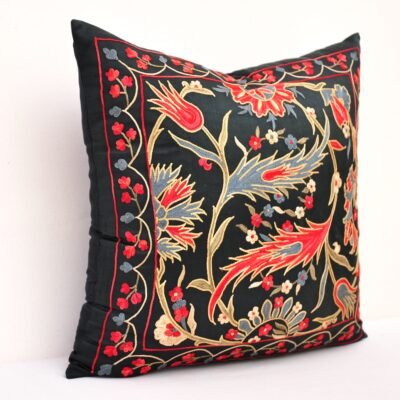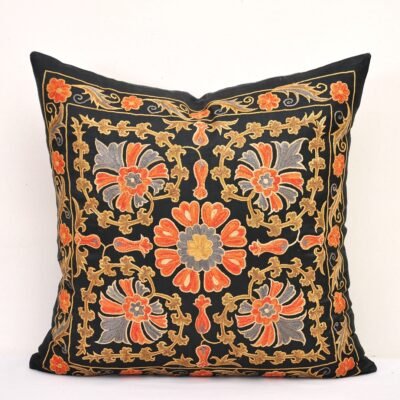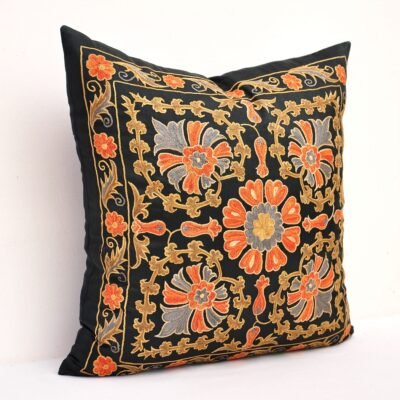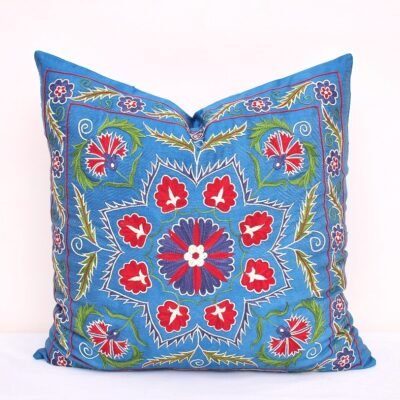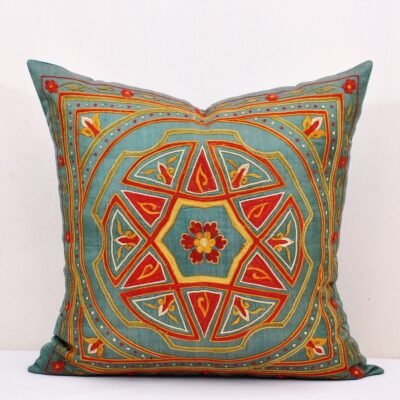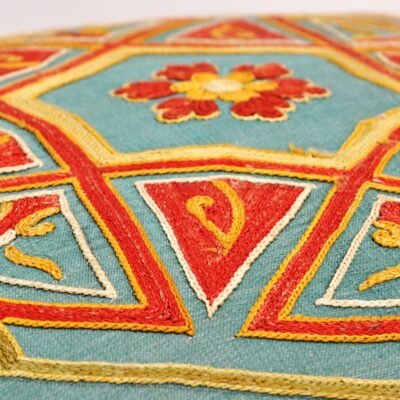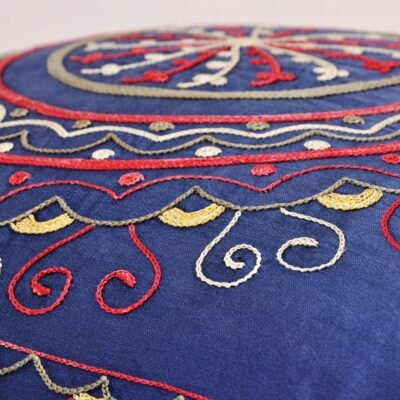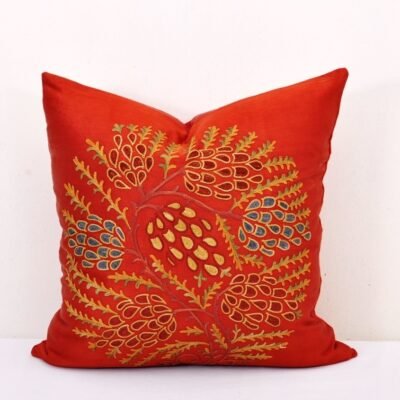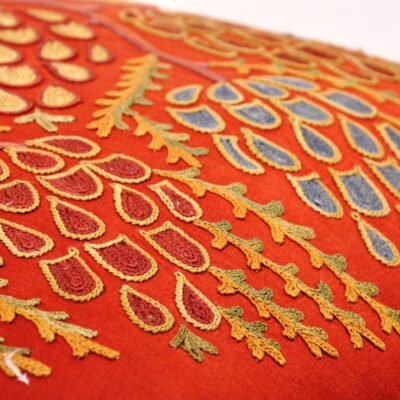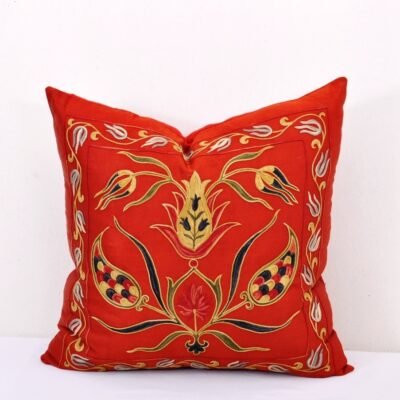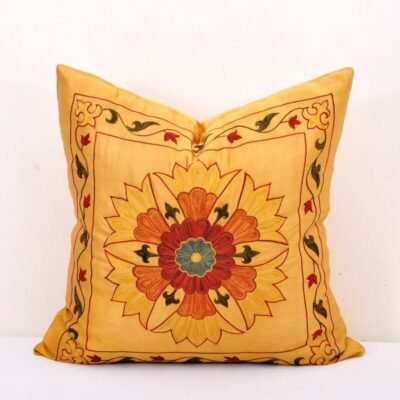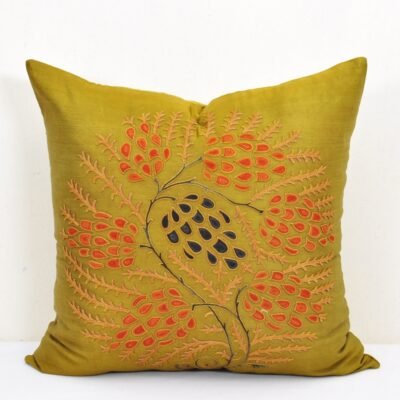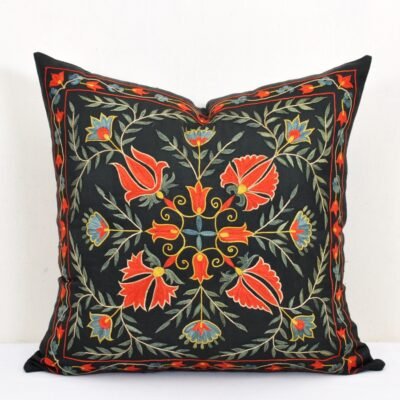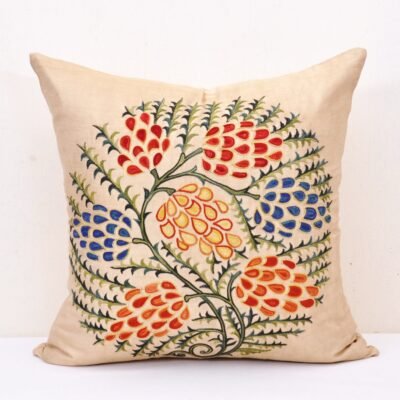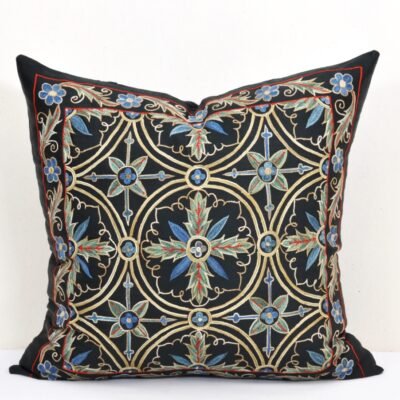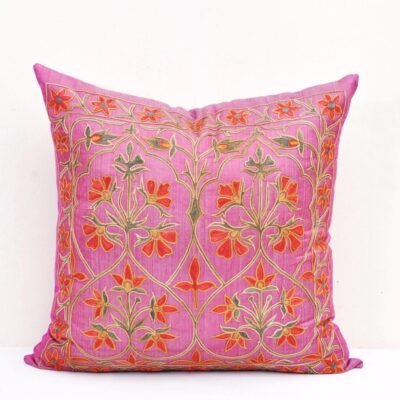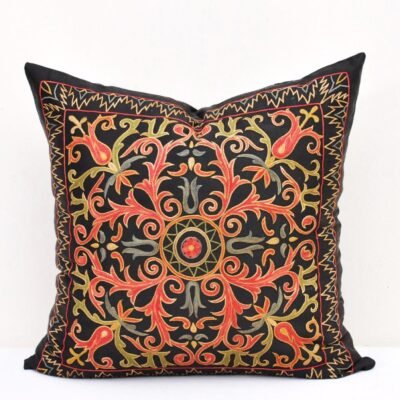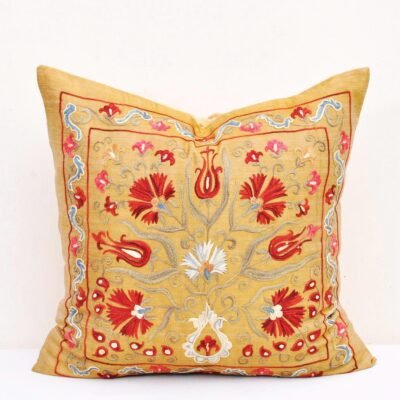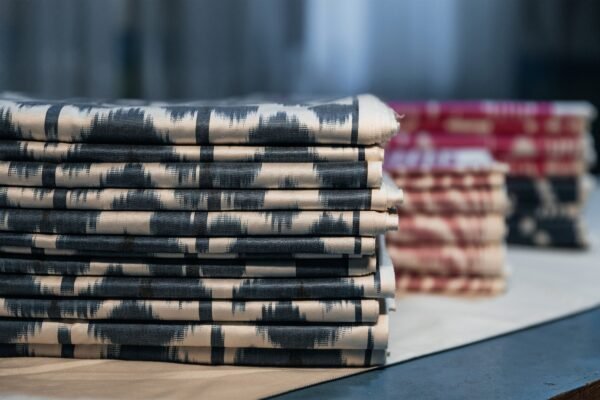The Cultural Significance of Suzani Embroidery
The cultural significance of Suzani embroidery is immense. It shows the tradition and spirit of the entire region through the depictions of various symbols in intricate designs. Mind you, our focus might be on Suzani embroidered pillows, but this type of embroidery has been used for various other things, from table and furniture coverings to wall hangings and rugs.
Nevertheless, such designs will help you determine the various symbols the women used to create them, from flowers to leaves, fruits, the sun, moon, birds, fish, etc. It's interesting to think of these not only as direct representations of nature and the world but also of fertility, prosperity, freedom, and protection. Thus, the beliefs of the nations are clearly integrated into the designs.
Moreover, creating Suzani pillow covers and other embroidered designs was like a rite of passage for young women. It was a bonding moment between the women in a family and helped young women create a dowry—something they would present to their husbands upon getting married to show their skill set.
Even though dowries are not practised in many countries nowadays, it's interesting to think about how the women would prepare for their new life with their husbands by taking a part of their tradition to the new home. It creates a sense of appreciation for these practices and the time and effort used to create just one design. Maybe that's why so many modern households incorporate Suzani pillows into their modern interiors.
Materials Used in Suzani Embroidery: A Focus on Silk
Let's discuss what a Suzani pillow truly includes. The traditional practice of Suzani embroidery included creating designs on a piece of cotton or, often, silk. That material would be embroidered using silk and cotton thread in varying colours. Here’s what the design usually included:
- Designs and patterns: Depending on the design plan for a specific Suzani pillow, the craftsmen would use thread in suitable colours. The colours most commonly used in Suzani embroidery are red, blue, yellow, orange, green, etc. The patterns usually repeat throughout the design to form a feeling of unity and can be symmetrical or only repetitive.
- Symbols and meanings: The most common symbols included in Suzani embroidery include flowers, leaves, the sun, the moon, fish, birds, and fruits. This shows what people considered important at that time and also represents their beliefs. Many of these symbols were and still are connected to good luck, fertility, and prosperity.
- Colour symbolism: Each colour included in a piece with Suzani embroidery had its own meaning. Thus, reds represented love and possibly even fertility. Yellow represents happiness and hope, similar to what each new day brings with the rising of the sun. The colour green and fruit symbols represented nature and hopes of a fruitful year, as many people then thought such representations could influence reality.
- Regional variations: While originating from Uzbekistan, Suzani embroidery was practised in various regions and countries and evolved into several regional variations. Thus, we have the Bukhara Suzani, which is notably floral and geometric. The Khodjent, Nurata, Pskent, Samarkand, Shahrisabz, Tashkent, and Ura-Tube Suzanis have all gotten their names after Ancient or modern cities in Uzbekistan or other Central Asian cities, all following the same traditional motifs and patterns.
These are far from the only regional varieties or symbols you can find on Suzanis. The truth is that the designs can vary from complex and bold to more modern with a mix of traditional. All kinds of narratives are covered in Suzani embroidery, which makes them unique, intricate, and the perfect addition to your home if you want to bring a bit of tradition and spirituality to your space.
How Suzani Pillows are Made Today
Nowadays, Suzani embroidery is still being done in Central Asia. However, with many people relocating to countries like the UK, the tradition has also moved to new regions and adopted different variations to fit the market. So, it's common to find Suzani pillows with a modern twist in the design to fit current household decor trends.
Another thing that should be considered is the changes that industrialisation brought to various traditions like Suzani embroidery. It has led to mass production and machine embroidery that still follows the same symbols and colour schemes but no longer includes hand-made designs.
Whether you stick to the traditional way of making Suzani embroidery or buy some of the mass-produced designs is entirely up to you. However, consider the costs, time, and effort to make the designs. The hand-made embroidery and fabric dyeing are often worth a few extra pounds if you want authentic Suzani pillow covers or other traditional decor.
Incorporating Suzani Pillows into Various Decor Styles
As mentioned briefly, some interior design trends show that people want to mix the modern with the traditional. We've found that some prevalent interior design trends include simplicity and minimalism with the predominant use of neutral colours. However, that little splash of colour can easily come from something like a Suzani pillow!
Think about it—these embroidered designs can be customised to fit your space regarding colour and material. While usually incorporating cotton and silk, there are no limitations as to the colours or symbols represented, meaning you can easily make them fit your preferences.
Although incorporating such traditional elements is not everyone's cup of tea, we urge you to look into the Suzani and Ikat designs sold on our website to find the ideal pieces of decor for your space. Whether a table runner or silk pillow, there are various ways to incorporate Suzani embroidery in your space, so give it a chance!
Caring for Your Suzani Pillows: Tips and Best Practices
Once you decide to purchase Suzani pillow covers or other embroidered pieces of decor, you should learn how to care for them as well. Some pieces will come with a recommended maintenance technique, but that will not always be the case. If it's not for your products, you can either ask the craftsmen or shop that sold you the decor or follow our helpful guide.
With years of experience in handling delicate materials and Suzani embroidery, we've developed a tried-and-tested method for maintaining them. Our recommendations will ensure your Suzani pillows remain spotless and brand-new without causing any damage:
- In case of spills or spots, spot-clean the item as soon as possible. Use a soft brush or clean cloth and a mixture of lukewarm water and mild soap. Do not use harsh chemicals, as they can cause irreparable damage to the material.
- If your Suzani pillow has accumulated dirt and you simply want to wash it, you can do that by hand using the same mixture of lukewarm water and mild soap mentioned above. Again, do not rub the material, as that will only damage it. When washed, leave it to air dry.
- Avoid machine-washing anything with Suzani embroidery, whether a table runner, covering, or Suzani pillow cover. Always opt for hand-washing to prevent damage.
Where to Buy Authentic Suzani Pillows
Buying authentic Suzani pillows is not as challenging as you might think! In fact, there are various artisan markets across the UK where you can locate artisans offering various designs in all different sizes. Furthermore, some artisans choose to sell their designs online, so a simple Google search can provide you with a quick list of all the people who sell Suzani embroidered pillows online.
However, only a few tried-and-true companies truly follow the traditional way of creating Suzani embroidery. Take Alesouk for an example. All our designs are authentic and handcrafted, which means you will benefit from high-quality materials and genuine designs that accurately represent the cultural traditions of these Central Asian countries.
Our company collaborates with artisans to acquire these decor pieces rather than mass-produce them. We offer various Suzani and Ikar designs at affordable prices, whether pillow covers, table covers and runners, or oriental rugs.
Final Thoughts
Thank you for reading our detailed guide on Suzani pillows, the history of this type of embroidery, its cultural significance, its notable features, etc. We hope you now understand how important this embroidery has been for the entire region across the centuries and how adding a Suzani pillow to your decor can help give your living space the perfect combination of modern and traditional.
If you are still looking for the best Suzani pillows with the highest quality but the most fair prices, please consider purchasing from Alesouk. There are various designs for you to consider, and we also have a 30-day money-back guarantee policy if you are unsatisfied with your purchase. Feel free to order through our website or contact us through email, phone, or the dedicated contact form.
FAQ
What makes Suzani pillows unique in the world of embroidery?
Suzani pillows are unique because they directly represent a traditional practice from Central Asia that has prevailed for centuries. The hand-crafted embroidery, the vibrance, and the versatility of the designs will leave you speechless as you think about the time and effort put into hand-stitching and embroidering each piece.
How can I tell if a Suzani pillow is authentic?
You can tell if a Suzani pillow is authentic if you verify that with the seller and look into their existing reviews. Furthermore, you should check if the pillows are hand-stitched and hand-made instead of mass-produced. Finally, look into the quality of the materials used.
Can Suzani pillows be customised?
While in the past, Suzani pillows represented a specific area in Central Asia, nowadays, the focus is on the design rather than the region of origin. Thus, you can order custom Suzani pillows and have them incorporate the traditional symbols and colours in a way that fits your requirements.
How do I care for and maintain my Suzani pillow?
Suzani pillow covers or any other item that has this type of embroidery requires specific maintenance that does not include using harsh chemicals. Due to the delicate fabric and stitching, you should spot clean or hand wash it with lukewarm water and mild soap without scrubbing or pulling on the fabric.
Where is the best place to buy Suzani pillows?
We recommend buying Suzani pillows from local craftsmen or companies that hand-make all their Suzani embroidered decor. At Alesouk, we have hand-crafted Suzani pillow covers and pillows that are authentic and affordable, so you cannot go wrong by purchasing from us!

